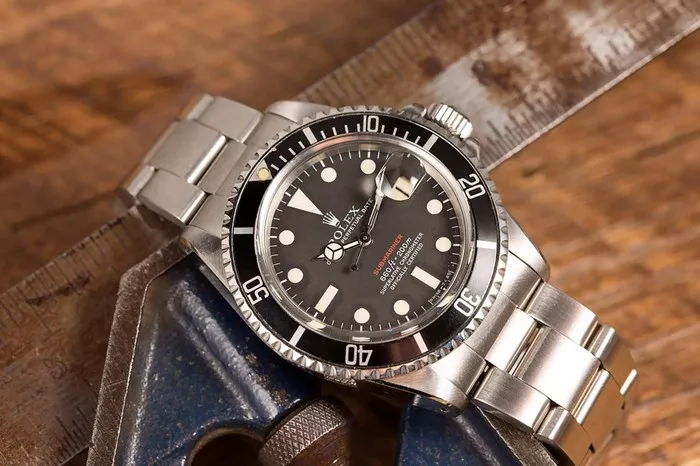Rolex, a brand synonymous with luxury and precision, is renowned for its commitment to excellence in watchmaking. One of the standout features of Rolex watches is their reputation for being robust and waterproof. This article delves into the specifics of Rolex’s waterproof capabilities, exploring the history, technology, and practical considerations that make Rolex watches a preferred choice for those seeking reliability and performance in aquatic environments.
The Evolution of Rolex’s Waterproof Technology
Early Innovations
The journey of Rolex towards achieving waterproof excellence began in 1926 with the introduction of the Oyster, the world’s first waterproof wristwatch. This revolutionary design featured a hermetically sealed case, protecting the movement from dust, moisture, and pressure.
The Oyster Case
The Oyster case remains a cornerstone of Rolex’s waterproof technology. Its design includes a screw-down case back, a screw-down crown, and a screw-down bezel, creating a virtually impenetrable barrier against water. The robustness of this case design has been continuously refined and remains a defining feature of all Rolex watches.
Waterproof Ratings and Specifications
Understanding Waterproof Ratings
Water resistance in watches is measured in meters (m), atmospheres (ATM), or feet (ft). Rolex uses meters to specify the depth at which their watches can withstand water pressure without compromising functionality.
Standard Rolex Models
Most Rolex watches, including the Datejust and Day-Date collections, are water-resistant to a depth of 100 meters (330 feet). This level of water resistance makes them suitable for everyday activities, such as swimming and snorkeling, but not for deep-sea diving.
Professional Diving Watches
Rolex’s professional diving watches, such as the Submariner and Sea-Dweller, offer significantly higher levels of water resistance. The Submariner is water-resistant to 300 meters (1,000 feet), while the Sea-Dweller can withstand depths of up to 1,220 meters (4,000 feet). The Deepsea model pushes the limits further, boasting a water resistance of 3,900 meters (12,800 feet).
Key Technologies Behind Rolex’s Waterproof Capabilities
Triplock and Twinlock Systems
Rolex employs two primary crown sealing systems: the Twinlock and Triplock systems. The Twinlock system, used in most Rolex watches, features a double-sealed winding crown that ensures water resistance up to 100 meters. The Triplock system, used in professional diving watches, includes an additional O-ring gasket, providing a triple-sealed barrier and significantly enhancing water resistance.
Parachrom Hairspring
The Parachrom hairspring, a proprietary Rolex innovation, enhances the watch’s resilience to shocks and temperature variations. This component plays a crucial role in maintaining the precision and reliability of Rolex watches, even in extreme underwater conditions.
Oysterflex Bracelet
The Oysterflex bracelet, available on some Rolex models, combines the robustness of a metal bracelet with the flexibility and comfort of an elastomer strap. Its high-performance elastomer coating ensures durability and resistance to environmental elements, including water.
Practical Considerations for Rolex Watch Owners
Routine Maintenance
To maintain the water resistance of a Rolex watch, regular servicing is essential. Rolex recommends servicing every 10 years, but this can vary based on usage and environmental factors. During servicing, the gaskets and seals are checked and replaced if necessary to ensure the watch remains waterproof.
Proper Use of the Crown
One of the most common causes of water damage in watches is improper use of the crown. Ensuring the crown is fully screwed down before exposure to water is crucial. The screw-down mechanism creates a watertight seal, preventing water ingress.
Avoiding Extreme Conditions
While Rolex watches are designed to withstand a wide range of conditions, it is advisable to avoid extreme temperature changes and high-pressure environments outside of the watch’s specified limits. These conditions can compromise the integrity of the seals and gaskets.
Testing and Certification
Rigorous Testing Procedures
Every Rolex watch undergoes stringent testing to ensure its water resistance. These tests include submersion in water tanks and exposure to pressure equivalent to the specified depth rating. The Deepsea model, for instance, is tested in a specially designed hyperbaric chamber to simulate the extreme pressures encountered in deep-sea diving.
COSC Certification
Rolex watches are certified by the Swiss Official Chronometer Testing Institute (COSC) for their precision and performance. This certification ensures that each watch meets the highest standards of accuracy and reliability, further reinforcing Rolex’s commitment to quality.
See Also: Do All Rolex Watches Have A Serial Number
Notable Rolex Models and Their Water Resistance
Rolex Submariner
The Rolex Submariner, introduced in 1953, is perhaps the most iconic diving watch. Known for its robustness and reliability, the Submariner is water-resistant to 300 meters. Its unidirectional rotatable bezel allows divers to accurately track dive times.
Rolex Sea-Dweller
The Sea-Dweller, first released in 1967, was designed for professional divers working at great depths. With a water resistance of 1,220 meters, it features a helium escape valve, allowing trapped gases to safely escape during decompression.
Rolex Deepsea
The Deepsea, part of the Sea-Dweller collection, represents the pinnacle of Rolex’s diving watch technology. Its water resistance of 3,900 meters is achieved through the Ringlock system, a patented case architecture that ensures structural integrity at extreme depths.
Conclusion
Rolex’s commitment to waterproof technology is evident across its entire range of watches. From the everyday resilience of the Datejust to the extreme capabilities of the Deepsea, Rolex offers a watch for every aquatic adventure. Understanding the specific features and maintenance requirements of these watches ensures that owners can fully enjoy their Rolex timepieces, confident in their reliability and performance under water.

